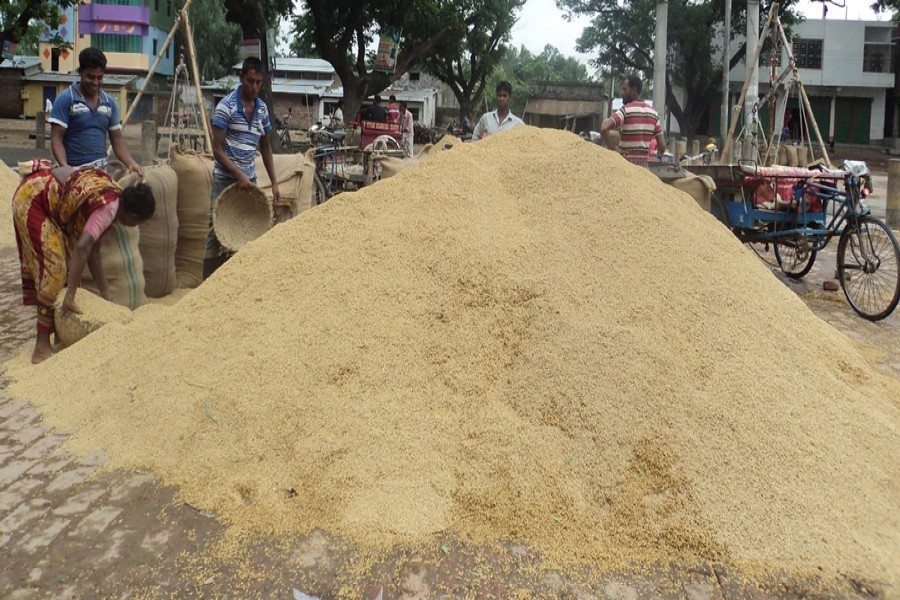Rice prices rose steeply in the city market again despite an all-time high Boro yield and record import of the staple grain.
The price surge has left the consumers worried, who are already battered by the increasing prices of essentials, market experts said.
On Tuesday, Brridhan-28 was selling at Tk 55-Tk 57 a kg on the retail market while coarse varieties like swarna at Tk 46-Tk 50 a kg, registering a hike of Tk 4.0 in a week.
Fine quality rice like Miniket, jeerashail and najirshail saw an increase of Tk 5.0 per kg in seven days -- now selling at Tk 65-Tk 78 a kg.
The rice output in the just-concluded Boro season, according to the Bangladesh Bureau of Statistics, was an all-time high of 19.5 million tonnes, but it failed to have an impact on the rice market.
Also, the last financial year (FY '18) saw a record rice production -- 36.2 million tonnes.
The food ministry data revealed that rice import was also all-time high in the last financial year -- 4.1 million tonnes.
Traders attributed the price hike to persistent high paddy prices, rains and re-imposition of higher import duty on rice.
But experts see market syndicates behind the price surge.
Wholesale rice markets in the city -- Badamtoli, Babubazar and Mohammadpur Krishi Market -- saw a hike of Tk 2.0-Tk 2.5, trading sources said.
Mohammad Asadullah, joint secretary of Badamtoli-Babubazar Rice Wholesalers Association, told the FE that the rice prices have been on the uptrend at mill gates for the last ten days.
The price of one sack of Brridhan-28 (50 kgs) has increased by Tk100-Tk150 during the period, he said.
President of Bangladesh Auto Major Husking Mill Owners Association (BAMHMOA) Md Abdur Rashid said paddy are now selling at much higher rate.
The price of Brridhan-28 paddy is Tk 850-Tk 900 a maund (40 kg) and jeerashail Tk 1000-Tk 1050, he said.
Many traders and well-off farmers are now stockpiling paddy for further profits, causing a short supply of the grain to the market, he added.
Md Jikrul Hoque, managing director of Jikrul Auto Rice Mill in Nilphamari, said continual rains have hampered paddy-drying process, resulting in such a hike.
Contacted, Sarwar Alam Kajol, a Naogaon-based importer, said the import of the staple grain remained almost halted following the re-imposition of higher duty.
He said the import cost of Indian ratna (similar to Brridhan-28) now stands at Tk 48-Tk 50 a kg, compared to Tk 44-Tk 46 a kg at local mills.
Imports have now declined to just 900-950 tonnes a day, which was more than 10,000 tonnes a day before the re-imposition of duty, he said.
Consumers Association of Bangladesh (CAB) president Ghulam Rahman termed unusual the recent rice price hike against the backdrop of bumper Boro output.
He said CAB market reports showed milling cost of Brridhan-28 would not be more than Tk 40 a kg as per the trend in paddy prices, but the rice is being traded at Tk 55-57 a kg on the retail market in Dhaka.
Centre for Policy Dialogue (CPD) research fellow Towfiqul Islam Khan told the FE that consumers didn't get the benefits from record rice production and imports.
Such hike in prices is abnormal as there is no supply shortage, he said.
Millers, importers and their allied traders should be brought under close scrutiny to rein in any artificial price hike, he added.
He said the government stock of rice is now pretty good -- 1.3 million tonnes -- and it could be increased further.
The government should start its open market sale to stabilise the market so that the limited-income groups could buy rice at affordable rates, he suggested.
The expert also urged the government to take steps immediately to minimise the huge price gap between the farmers' end and the consumers' end.


